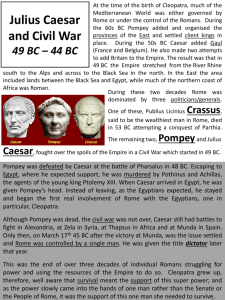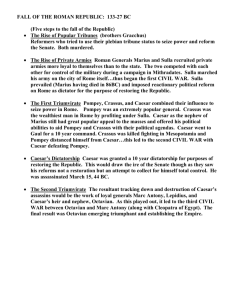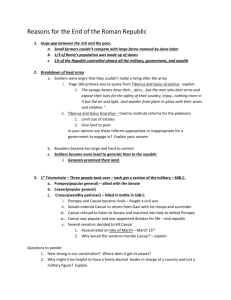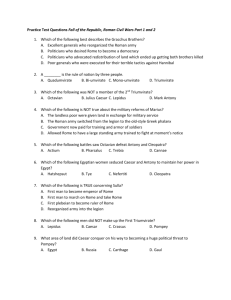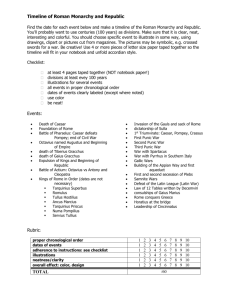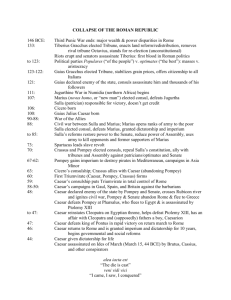Gaius Julius Caesar Part II
advertisement
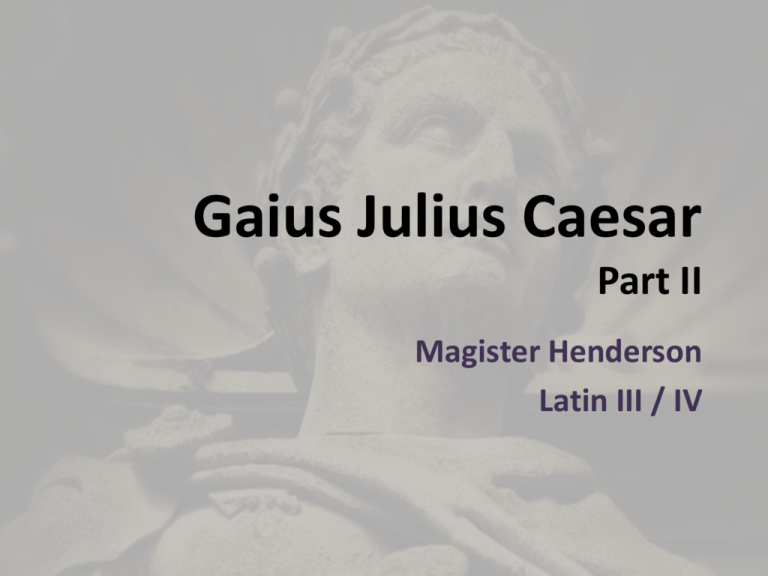
Gaius Julius Caesar Part II Magister Henderson Latin III / IV The First Triumverate • Caesar’s financial benefactor, Crassus, had been political rivals with the distinguished Roman general, Gnaeus Pompeius Magnus (Pompey the Great). • Caesar saw the potential in reconciling the two men, and succeeded in doing so, creating a secret three person alliance that has come to be called the first triumvirate. • The triumvirate was sealed with the marriage of Pompey to Caesar’s daughter, Julia. Caesar in Gaul • Caesar was granted Cisalpine Gaul as his proconsular province to govern. • But when unrest developed across the Alps, the senator also granted him governorship of Transapline Gaul, which today is south France. • This command gave Caesar command over four legions and opportunity for military glory. Caesar in Gaul (continued) • Caesar spent 8 years in Gaul subduing many tribes and making a few into allies. • During that time he crossed the Rhine and repelled German invaders. • He also crossed the English channel and won a victory against the tribes in Britannia, though he did not leave behind a permanent occupation force. The End of the Triumvirate • While Caesar was in Britain, his daughter Julia died in childbirth. • Caesar attempted to reaffirm the alliance with Pompey by arranging a marriage with his greatniece, Octavia (Augustus’ sister), but Pompey declined the arrangement. • Soon after Crassus was killed along with his son Publius while fighting the Parthians in the east. The End of the Triumvirate (continued) • Pompey instead married Publius Crassus’ widow, Cornelia Metalla, who was the daughter of Caecilius Metallus Scipio, one of Caesar’s most outspoken critics. • The next year Pompey was appointed sole consul, a rare move designed by the Senate to give him power to decide Caesar’s fate once he left his appointment as governor. The Start of Civil War • The next year Caesar petitioned to run for consul in absentia, so that he could take political office immediately after leaving his governorship; a petition Pompey denied. • Ordered to disband his army, and certain he would face prosecution upon his return to Rome, Caesar crossed the Rubicon into Italy with his army. The Start of Civil War • Rather than defend Rome, Pompey and many Senators fled for Epirus, where Pompey had nine legions. • In his haste to flee, Pompey forgot to secure Rome’s treasury, a tactical error that gave Caesar a financial advantage in the war. • With Pompey and his supporters gone, Caesar took possession of Rome without a fight. Pompey’s Defeat • Caesar left his lieutenant Marc Antony, in charge at Rome while he engaged Pompey in Greece. • In July of 47 BC, Caesar was nearly defeated at Dyrrhachium, but escaped when Pompey did not pursue him aggressively enough. • Later that same year, Caesar won the decisive victory at Pharsalus. Defeated Pompey fled to Egypt. Caesar’s Dictatorship • Returned to Rome and was appointed dictator, while Marc Antony was made his magister equitum. • Caesar followed Pompey to Egypt, but upon arrival was presented with Pompey’s severed head, by Ptolemy, the young king of Egypt. • Displeased by Ptolemy’s treatment of Pompey, Caesar supported Ptolemy’s older sister, Cleopatra, in her claim for the throne.
